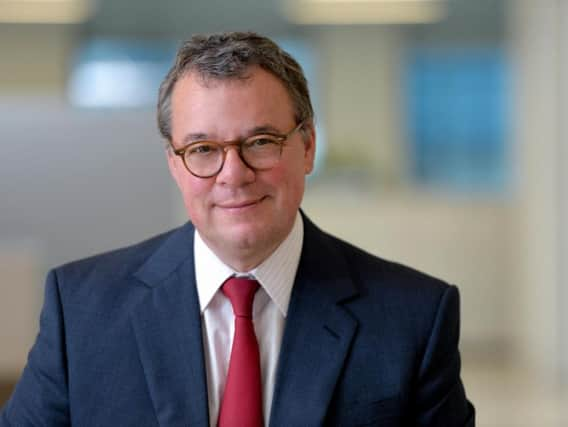Keith Skeoch - Building a fairer economy needn’t cost the earth


As we look ahead to this week’s debates and discussions at the World Economic Forum, it’s clear that we need to take stock of what is becoming an increasingly divisive world.
We all have a “not-to-be-missed” opportunity to refresh and reinvigorate the mutual benefits between businesses, government and people that are central to a well-functioning capitalist economy. We have an opportunity to help rebuild trust and faith in capitalism – the economic mechanism that has delivered rising prosperity for most of the last 400 years.
Advertisement
Hide AdAdvertisement
Hide AdHowever, the notion of financial return above all else has come into question, as has the belief in the “trickle down” effect of tax cuts. Therefore we need to accelerate the shift to a more responsible and inclusive capitalism where the benefits are clear to all – not just the few.
With employment so high and inflation so low, the focus clearly needs to be on government investment that will boost capacity and raise productivity over the medium term. For sure, this implies spending on physical infrastructure but it is just as important that we invest in our human infrastructure. Education and well-being are equally critical to productivity and the long-term sustainable health of the economy.
Rebuilding trust
As an asset manager, we play a central part in turning the public’s savings and pensions into investments, and allocating capital throughout the economy. Historically, however, we’ve been in an industry that’s very product orientated, and while being great at what we do may boost peoples’ investments and the bottom line, it’s doing little to lift the low level of trust in the industry. In my view, the asset manager of the future must have a strong sense of its place in society.
What, then, needs to change? This partly entails addressing financial inequality. We have to find ways to give all types of investors access to the returns that have historically only been available to the wealthy, such as from private markets.
To create the necessary investment vehicles, especially at the right price, will take scale and ingenuity. It will also require an honest conversation about how we manage investments and the kind of timeframes required to generate the desired returns. In an industry that hangs on the next quarterly corporate update, that conversation will not be easy. Nonetheless, it is one we must have.
And then there is stewardship and ESG (environmental, social and governance). It’s probably fair to say that 2019 belonged to ESG. You couldn’t move without finding an investment house boasting about its ESG capabilities or the extent to which it had integrated ESG into its investment processes. And, to be fair, this is understandable. For the last 25 years I have believed that ESG factors are major drivers of long-term investment returns but, most of all, ESG is about getting it right for the next generation.
Becoming carbon neutral
I believe we all need to be responsible investors, which means we are good stewards of the capital we allocate. Take climate change, it’s becoming increasingly apparent that the physical devastation will also bring financial risk for many firms and industries, such as reinsurance, real estate, forestry and energy.
On most counts, however, the global response has fallen shy of what’s needed. Many fear the world won’t even meet the modest targets set in Paris. The recent Conference of Parties 25 in Madrid was a major disappointment and exposed deep divides between nations.
Advertisement
Hide AdAdvertisement
Hide AdThat’s not to say it’s time to throw in the towel. In the UK, for example, commitments made by the previous government set it apart as a leader in the fight against climate change. If we genuinely act on these commitments, I believe we can unite people behind a common cause, including the alienated youth vote.
As a company, we’re doing our part to address climate change. We have pledged to offset our entire carbon footprint and become carbon neutral in 2020. The carbon credits we buy will fund projects that reduce greenhouse gas emissions, such as restoring forests, modernising power plants and increasing the energy efficiency of buildings.
Furthermore, we have also committed to using 100 per cent renewable energy in our buildings, and vowed to cut our greenhouse gas emissions from energy use by 50 per cent by 2030.
Where does all this leave us? We must strive to deliver sustainable growth that benefits the broadest cross-section of society. So, while we may contend with the latest twists in the trade war or possible market correction, we must continue to focus on doing the right thing, for our clients, our people, our shareholders and the society in which we operate. The foundations for action are there; it’s our duty to ensure we build on them.